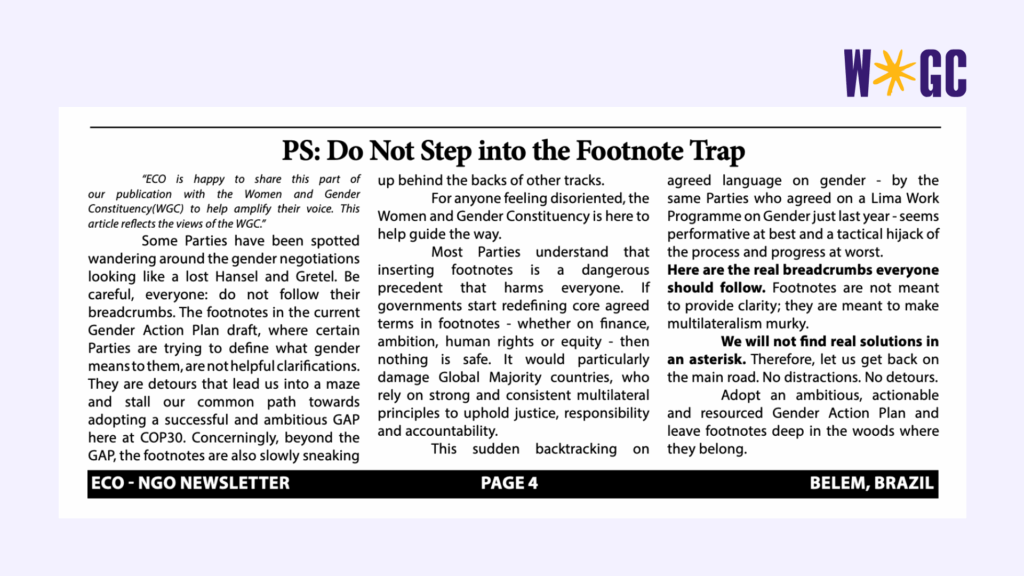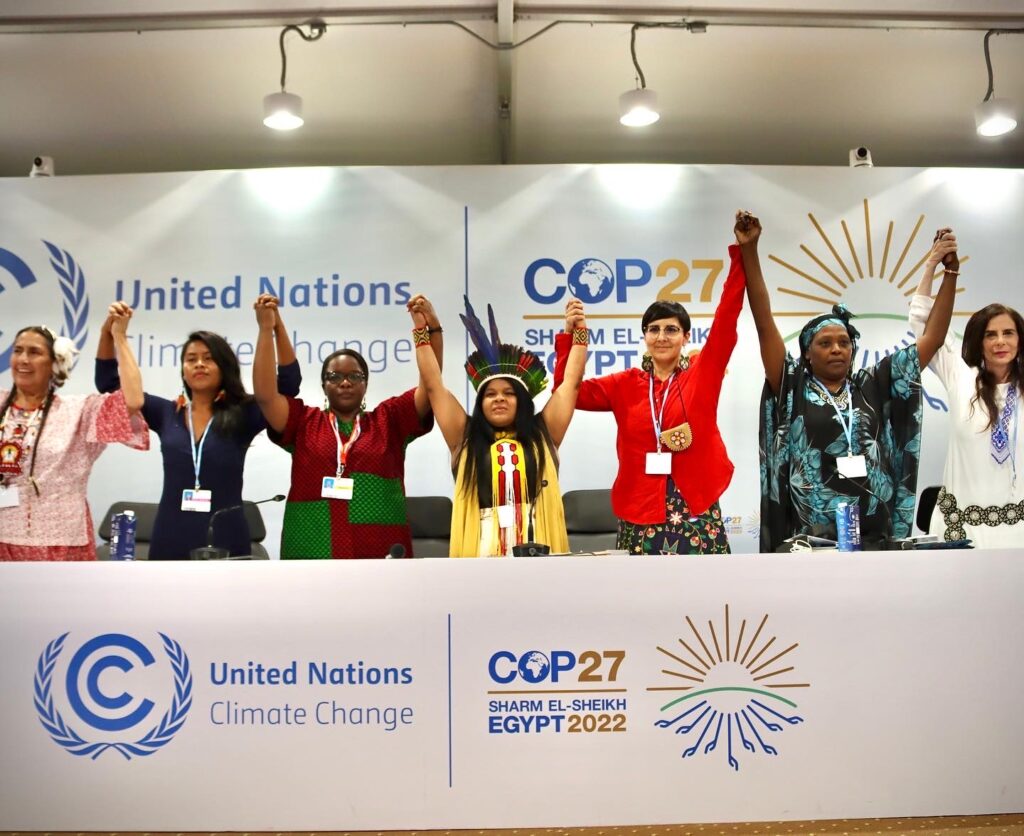
PS: Do Not Step into the Footnote Trap
19/11/2025
The Women and Gender Constituency is proud to be supporting a delegation of frontline and grassroots African leaders and feminist advocates to participate at COP27 and to raise the demands and voices of the African Feminist Taskforce.

Semia Gharbi is the chair of a national NGO, the Association of Environmental Education for Future Generations (AEEFG), and the Focal point of Women Environmental Program (WEP) Nigeria. She has 25 years of experience in ecosystems and sustainable development teaching; she also conducts training and consultancies. She is a member of PAN (Pesticide Action Network) Africa, WECF international, and WMG (Women Major Group). She is the coordinator for the MENA region for an international network IPEN working on hazardous chemicals. Gharbi has a strong multidisciplinary background in education and environment and received a master’s degree in the environmental field from the Faculty of Science of Tunis.
Zoneziwoh Mbondgulo-Wondieh (@ZoFem) is an award winning feminist humanitarian storyteller and researcher with over ten years of experience in gender and digital activism, movement building, policy advocacy and youth leadership. She is the Executive Director at Women for A Change in Cameroon where she designs, directs and executes programs for the advancement of women and girls sexual and reproductive health rights, leadership, and empowerment. Her advocacy involves creating spaces for women and girls to engage with policy and decision makers at the highest levels including the Commission on the Status of Women (CSW), and translating and raising awareness on national and international women’s rights protocols and frameworks including the Maputo protocol and the Beijing Platform for Action. Zoneziwoh holds an MSc. in Sex, Gender and Violence and is currently a Ph.D candidate in Conflict Resolution.
Gertrude Kenyangi Kabusimbi graduated with a Bachelor of Science (Agriculture) from Makerere University, and a few years down the road obtained an MA (Integrated Rural Development Planning) and an MA Gender Studies all from Makerere University. For a short period after her studies she held a white collar job with a bank as a credit officer before discovering that her calling was not in air-conditioned, pristine and sanitized work environments, but with the people, right at the grassroots, getting her hands dirty. She therefore resigned her bank job and founded Support for Women in Agriculture and Environment (SWAGEN), a network of forest-edge, grassroots women Community Based Organizations, where she still serves as Chairperson. She is an activist for Adaptation to and Mitigation of Climate Change, poverty alleviation, promotion of sustainable use and management of natural resources, advocating for human rights, promoting gender equality and other new and emerging issues such as food security and food sovereignty. She was democratically elected by Civil Society Organizations across the African continent to the position of Observer on the Climate Investment Fund – Forest Investment Program.
Yolanda Mulhuini is a social activist for the human rights of women and girls. She is executive director of Grupo para o Desenvolvimento da Mulher e Rapariga (Group for the Development of Women and Girls ); leads trainings for women and girls in urban and rural areas; and is focal point of the GCF Adaptation Fund where she monitors GCF and Adaptation Fund projects.
Zainab is a climate justice advocate for women’s and girls’ rights. As a development practitioner for 6 years, Zainab works in community and international development primarily to strengthen research and advocacy, influence policies, and manage projects promoting women’s and girls’ issues in areas of meaningful youth engagement, sexual and reproductive health and rights, inclusive governance, and climate change. Zainab collaborates with UNICEF as a Global Ambassador of the U-Report tool, championing people-centred development by amplifying the views of young citizens (over three million in Nigeria alone) on themes, including education, digitisation, climate change, and governance. As a delegate of the UNFCCC’s Youth Constituency (YOUNGO), and the Women and Gender Constituency (WGC), she advocates for inclusiveness in global climate change decision-making and action. Likewise, she is a member of the UNFPA Joint Youth Working Group on SRHR and Climate Change as well as the SRHR & Climate Change Coalition of Generation Equality.
Nada Elbohi is a Resource Mobilization and Partnerships Officer at Tamkeen Association, Co-Lead of Network of Empathy, and currently developing a youth project on sexual and reproductive health and rights. She has a BA in International Relations, focusing on Human Rights and Peace and Conflict Studies, and graduated valedictorian of her class with a joint-degree from the University of Amsterdam/Vrije Universiteit in The Netherlands. She is a strong believer in and advocator for the importance of education as a tool of empowerment, development, and to promote environmental sustainability.
Salimata BA, has more than 35 years of experience in the fields of community organizing, gender equity, training, communication, sustainable development, natural resource management, environment, combating desertification, climate change, biodiversity, household energy and decentralization. She is also, Secretary General of the Communication Network for Women’s Development in Senegal (RECODEF), Coordinator of the RECODEF Senegal Project – African Activists for Climate Justice (AACJ), Coordinator of the Gender Commission of the PACJA Senegal Platform, Member of the Synergy of the Senegalese Women’s Civil Society against Violence against Women -SYSC, Founding member of the Association of Senegalese Women and Information and Communication Technologies -FESTIC and Vice -President of the Senegalese Section of WILPF – Women’s International League for Peace and Freedom.